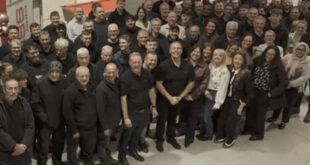Below is the full text of Rebecca Long-Bailey’s Labour conference 2019 speech.
Uma, isn’t she amazing! I want to thank her, youth strikers for climate justice and our trade union movement, Extinction Rebellion and our climate activists for coming together to make politicians listen.
And some brilliant politicians are listening – my amazing team. The very clever Alan Whitehead, for leading our green energy revolution. The legend that is Barry Gardiner, for leading the charge against international climate change. The amazing Danielle Rowley, bringing our Green Industrial Revolution to life with her Celtic charm. The total diamond that is Laura Pidcock who, tirelessly, is creating the Ministry of Employment Rights, the future Secretary of State. The Tyne Titan Chi Onwurah, passionately setting out Labour’s Industrial Strategy. The Sefton Superstar that is Bill Esterson, instrumental in our plans for business support and High Streets. The Sheffield warrior, Gill Furniss, developing our plans for Steel, Post bank and Royal Mail. And our amazing team in the Lords.
But just one more quick heartfelt thank you though, to John McDonnell and Andy McDonald, without whom today’s policies would not be possible.
The late, great Tony Benn once said “Hope is the fuel of progress and fear is the prison in which you put yourself” and for too long our communities have been afraid. Afraid of not having a job to go to, afraid of not being able to pay the bills and afraid of what the future might hold.
That hope of the future, that belief that life will get better for every generation coming through, seems to have been lost. And that hope will be trampled on once again.
If the right-wing free market Brexiteers in Number 10 get their way with no deal, there’s no two ways about it, we do face the destruction of industries yet again. But it’s going to be okay for them and their rich disaster capitalist friends as they bet against our economy and laugh all the way to their tax havens. And faced with the threat of climate catastrophe, well, they laugh their way through that too. “A primitive fear without foundation”, Boris Johnson said.
These are the very people who loaded the costs of the bankers’ crisis onto the backs of the poor. So be under no illusion, it will be the poor and the vulnerable who are forced to shoulder the human and economic price of climate breakdown.
This year, one of the worst tropical storms on record killed over a thousand people in Mozambique, catastrophic fires swept across the Amazon rainforest, Siberia and Greenland, and extreme heat was recorded all over the world.
The Met Office, the IPCC and others describe a potential future of extreme weather, rising sea levels, and water and food insecurity. And if we allow this to happen, if we don’t stand together as a society and define the battle against climate change as a battle for social justice, it will be seized upon by those who would divide us.
The far-right are ready to capitalise on climate change, the threat of resource scarcity and economic despair. And they will mobilise if we allow the cost of taking action to fall on the shoulders of the poor, workers and consumers to reinforce their messages of nationalism and exclusion.
But millions of people across the world took to the streets on Friday demanding climate justice, because they know that politicians need to wake up, act faster and provide social justice if we are to save the planet. And we agree. That’s why last year I announced Labour’s Green Industrial Revolution – the seeds of a Green New Deal.
Government intervention to rapidly decarbonise our economy and push aside decades of neoliberal policy to create the industries of the future. Quality, unionised, green jobs, a proper industrial strategy, public ownership of our water and energy, and intervention in the economy, to make sure that the technologies of the future are manufactured, assembled and installed here.
But now we need to go further, faster and we need to ask who will really own the future the Green Industrial Revolution brings? And this question goes right to the very heart of why we joined the Labour Party. If the height of our ambition is softening the ravages of unfettered capitalism and signing up to some watered-down version of austerity: well, we may as well all go home now.
But I know you are all here because we share a powerful belief. Passed on through our movement from generation to generation. That every financial and political decision made by government and by industry should be underpinned by one fundamental and immovable socialist principle.
To secure for the workers by hand or by brain the full fruits of their industry, and the most equitable distribution that may be possible upon the basis of common ownership. It might not be on the back of our membership cards anymore, but it’s in here.
So today, conference, I am setting out a bold vision for common ownership in our Green Industrial Revolution, with the ‘People’s Power Plan’. To start, we will deliver a seven-fold increase in offshore turbines in twelve years. But we can’t rely on the market to act fast enough.
So the people will take a majority stake in all new offshore wind farms and our National Transformation Fund will allocate £6.2 billion to jumpstarting a home-grown renewable industry.
Our People’s Power Plan will deliver an £83 billion investment and strengthen our manufacturing sector by using public buying power to support local businesses, re-shoring thousands of jobs to coastal towns.
Revenues will flow back to the people and 20 per cent of the public profits from offshore wind will be carved out for a ‘People’s Power Fund’, investing up to £1 billion into held back, coastal communities. It will invest in leisure centres, libraries, parks, harbour waterfronts – you name it – all to boost quality of life.
Because you see, the Green Industrial Revolution is about tackling climate change, yes, but it’s more than that. It’s the biggest economic lever we have to rebuild Britain after decades of deindustrialisation and to usher in a new era of public luxury; ‘a modern standard of living’.
But, austerity politics has led us to believe that healthy lives, a nice home, useful work, and the ability to buy the technologies of the future are not within our grasp anymore. If you are in the wrong income bracket, well you just can’t have it.
Take zero-emission vehicles: over 40 areas of the UK have illegal levels of air pollution, yet the government does nothing to make clean vehicles affordable for the majority of people.
Instead, as global headwinds sweep across the automotive sector, the jewel in the crown of British manufacturing, and plants close from Swindon to Bridgend, they just sit on their hands.
But we know the Tories’ game, we know they are quite happy to let the heart be ripped out of industrial communities. We’ve seen it before. Well, we’re not.
Today, conference, I can announce that Labour will secure this iconic industry’s future as part of the Green Industrial Revolution.
We will accelerate the electric car revolution with a vehicle scrappage scheme to take 400,000 of the dirtiest cars off our roads and 2.5 million interest free loans for the purchase of EVs. We’ll require that 100 per cent of the government car fleet is electric by 2025. That’s 70,000 new electric vehicles alone.
On private fleets, that make up half of all new vehicle purchases, we will reduce the cost of going electric with a waiver on the excise duty surcharge and providing certainty on company car tax. And for those that transition their entire fleet to EVs by 2025, we will install charging stations in workplaces and depots. In this way, Labour will ensure the right conditions are in place for an electric vehicle revolution on our roads.
But that’s not all. We’ll invest £3.6 billion into building charging networks. That’s over 72,000 charging banks, in towns and along motorways. And we will support the automotive industry to meet the increased demand these measures will bring.
Labour will make £3 billion of equity finance available to the automotive sector to invest in electrification of their plants. And we will exempt new investment in plant and machinery from business rates. We’ll bring R&D investment in the automotive sector in line with competitors, making £500 million available for new automotive technologies.
And we’ll invest £1.8 billion in collaboration with private investors, to build three huge battery production facilities, called ‘Gigafactories’, in Stoke, Croydon and South Wales, bringing thousands of jobs to these areas.
And to create a new, sustainable industry we will invest £500 million into four metal reprocessing plants to reprocess cobalt and minerals used in batteries, and a further £50 million will be invested into drop-off points and battery collection sites.
But, what if even the dream of owning a car is still out of your reach?
Or what if Beryl from Salford just wants a car for one day to do the weekly shop or to pick her grandkids up from school?
Well, Labour will invest £300 million to support the creation of ‘community car clubs’ owned by the community, so everyone has access to this technological revolution as easy as ordering a pizza. Through this bold package of measures, Labour will drive forward the electric car revolution and everyone will be a part of it.
So conference, what will Uma and her friends say 30 years from now? Well, I make no apologies for the belief in socialism that brought me here today. Yes, life was hard – it was for everyone I knew. And yes, despite that I managed to do very well. But it wasn’t a glittering X-Factor story of triumph over adversity. It was sheer luck. And aspiration built on luck is a lottery ticket that most of us will lose.
My socialism and your socialism isn’t about luck. It’s about saving the planet and ushering in a new era of public luxury based on social and climate justice. It’s about building an economy that offers financial security, common ownership and quality, unionised jobs. And it’s about making aspiration, a modern standard of living for everyone, a birthright.
So I say to our children: you will be happy, healthy, well off. And, just as Bill Heywood once said, “nothing is too good for the working class.”
I say, with the utmost conviction: we will make sure that nothing will ever be too good for you.
Source link



